#arrogance vs humility
Text
Believing in Oneself is a form of Humility
This piece reflects upon the importance of balancing the character trait of humility with a health sense of self-worth.
Most of us are familiar with some version of the following story (found here):
So there is a joke you probably know on the topic of humility. The chief rabbi of the synagogue at Yom Kippur is beating his breast and crying, tears running down his cheeks “I’m nothing, Lord! I’m nothing! I’m absolutely nothing!” Next to him the chief donor to the synagogue, a wealthy banker kneels down and hits…
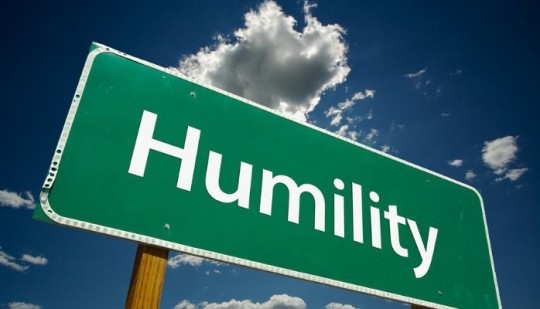
View On WordPress
#arrogance vs humility#being humble#belief#belief and faith#growth#Humility#imperfection#journeying forward#new beginnings#new beginnings spiritual coaching and consulting llc#Perfection#Prayer#R. Elimelech Biderman#self worth#self-compassion#self-esteem#soul#spiritual growth#spiritual journey#spiritual practice#Spirituality#Torah thoughts#Torah Wellsprings
0 notes
Text
Arrogance vs. Humility: Thor
There's an interesting post circling in fandom with many great metas and povs and it inspired me to expand on one of its threads. I have made a new post so the length and a different direction of meta doesn't bother op. I have also divided this meta into two parts. The first one is titled Thor because it is mainly an analysis of og Thor and og Loki in Thor 2011 . The second part will analyze Loki series for those who are interested.
Initially what sparked this meta was @tori-artemis (Artemis)' tags under an addition by @geehollow (Hollow). Initially I only wanted to write a short answer but I'm doomed by the narrative so I thought to first see what science has to say and I came across an interesting study and decided to use it in my analysis.
I used colors to quote each person because I'm going to quote two people, a study(indented) and add my own thoughts and I can't keep tagging or writing their names :P :D
So without further ado let's start. The topic was about the vice of Thor vs Loki. While perhaps the goal of the og post was to analyze the the topic through the concept of seven sins and virtues I don't intend to do that because it doesn't include every possible personality trait and it's not accurate enough from a psychological pov.
Vice is the first trait one should consider when creating a character. Vices embody the vibe that sparked the character in your mind, and in turn spark virtues, goals, backstories, everything. Of course it's different when dealing with characters inspired by already existing mythos, that already carry traits one has to grasp.
In the MCU, Thor's initial vice was arrogance. Deep seated arrogance born of being the golden prince, revered and indulged. Loki's initial vice was also arrogance, but born of thinking he's smartest than everyone else, due to having had to act covertly in order to get what he wants because he is not revered and not indulged. For both of them these are things we can and should infer during the first movie.
As you've read Hollow states that the vice of both Thor and Loki was arrogance but in different ways. Artemis wouldn't call Loki's arrogance because Loki clearly behaves in a different way than other arrogant characters like Thor and Tony Stark. Therefore we must first define arrogance.
According to a new study there are three types of arrogance that can be dissected into 6 components.
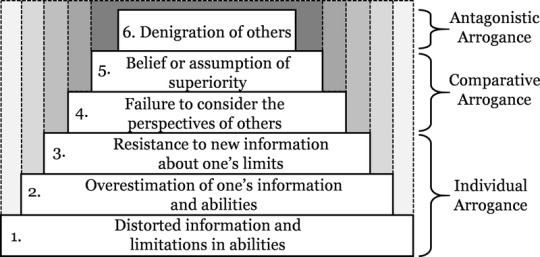
Individual arrogance: an inflated opinion of one’s abilities, traits, or accomplishments compared to objective truths;
Comparative arrogance: an inflated ranking of one’s abilities, traits, or accomplishments compared to other people
Antagonistic arrogance: the denigration or derision of others based on an assumption of superiority.
The types and components of arrogance depicted in Figure 1 are meaningful together because some of the concepts seem to implicate others. One cannot be overconfident about one’s knowledge in a domain (second-largest box) without first having some relevant limitation in knowledge about that domain (largest box); if one disparages others unfairly (smallest box), one is likely to fail to take their perspective and, further, one is likely to believe in one’s superiority compared to them (third- and second-smallest boxes, respectively); and so on. Therefore, the position of each component in the figure reflects a close dependency. Yet, it is possible for causation to flow from smaller to larger boxes, as well. For example, if one hates an individual for any reason, one might be motivated to underrate their capabilities or motives.
From this definition we can say that both Thor and Loki have levels of arrogance from the start but while Thor until the point Odin banishes him has checked all the six components in the picture, Loki is at a level two.
Thor with limited knowledge and an overestimation of his power decides to go to Jotunheim. He resists the disagreements about his limits and chances and fails to consider perspectives of his friends, his brother and father and Jotuns. He considers himself and his race superior to others and insults and criticizes Jotuns and his father. Loki on the other hand has overestimated his knowledge, abilities and whether or not everything goes according to his plan.
After his banishment, Thor comes down from the level of his hubris. When he fails to lift Mjolnir and after Loki's visit, he realizes that his rash actions had terrible consequences not just for him but for his family too. He's left alone and powerless. He doesn't see himself superior to these humans anymore. Jane helps him see things from different perspectives and as weak as a human he learns his limits. He knows he doesn't have the power to fight the Destroyer so he tries to do the only thing he can do, apologize to his brother. And when it seems that Thor's dying, he doesn't care about glory or what tales Asgard would say of his bravery. All he thinks about is that Jane is safe and that humility and selflessness restores his power. Loki though, in his desperation for acceptance, has made all the wrong choices.
Just as Thor overestimated his power, his physical strength and fighting skills in his attack to Jotunheim, Loki overestimates his power which is his intelligence and planning skills.
Loki in his arrogance thinks he can stage and ruin a heist, prevent Thor's rampage, and get rid of Laufey and Jotunheim through his usual method of solo strategies. He learns consequences when his plans inevitably stumble into variables he hadn't accounted for–the guard taking too much time in warning Odin, learning he's a rejected Jotun prince, being actually made regent, the Warriors Three and Sif and Heimdall betraying him. It's not the fact that he grew up learning underhandedness was his most effective method, it's that in the MCU he applied it presumably for the first time to real big events and had to deal with the consequences.
Loki lacks foresight. Like he lacks seeing all of the possible outcomes of his own schemes. That's how he ends up in a lot of messes in the first Thor film. So yeah - he definitely doesn't fully think things through as much as he'd like to believe himself to. Tbf he's not psychic. But it's more of an over reliance on his schemes working perfectly. That he doesn't consider all of the possible ways that those schemes can go south real fast (and end up doing so). So to me...it's less of it being arrogance of his own intellect and more like his over reliance on the schemes themselves. As well as an overestimation of his own control over the situation. Which *could* be considered arrogance... tho I don't think the film really displays it as such. Or it's just not very *clear* in displaying it as arrogance - like aside from occasionally calling Thor an oaf basically(which tbf he's kinda right with that assessment). And like - considering humans and Jotuns as weak and inferior at best - and monstrous at worst(which is less of a character vice and more of a symptom of Asgard's imperialism).
According to the definition of arrogance, what Artemis describes is in fact a complete list of all the reasons why Loki is arrogant. I also like to add that even the imperialism that causes Asgardians to be biased toward other races is rooted in political arrogance and their sense of superiority(Although we can argue that Loki up until his conversation with Odin, did not believe the Asgardian propaganda as he asked why the truth was hidden from him. It was only after he thought his parents see Jotuns a monsters that he tried to radically separate himself from his race).
Like many aspects in this movie, these brothers are once again a yin and yang to each other. Thor's brawn against Loki's brain. Thor's strength represents Odin's warrior side and he is praised for it. While Loki's wit represents Odin's cleverness but unlike Thor, Loki isn't appreciated for a trait in which he is similar to his father and that's sth he wants to change.
Loki has a good plan, but he fails to consider how his action seem shady to those who didn't like and suspected him. And how that can motivate them to betray him. Everything would have gone according to his plan otherwise. He had managed to trick and kill Laufey, he unleashed Bifrost on those race of "monsters" and he had bested Thor in the battle of brain vs brawn. He was pinned but he thought he had won. He was at the top of arrogance level in his grief and madness.
"Look at you, the mighty Thor, with all your strength, and what good does it to you now, huh?"
He didn't consider that Thor, hot headed Thor who looked down on other races and tried to solve everything by throwing a hammer at it, would try to think his way out of this situation to save the people he previously hated.
In my eyes, Odin's banishment, Jane's and Selvig's and Darcy's companionships are only the stakes that make him walk in the shoes of the other side of the violence, but the real wake up call is seeing Loki behaving and talking as Thor used to.
Thor 1 is the origin story of both Thor and Loki, young princes who discover they were still untested, and Avengers 2012 shows the progression of their arcs after their vice has been exploited with one differing element: a support net being present or absent. Thor always had a support net, Loki never did, and their intertwined story shows exactly how in real life people go down their respective paths.
So if Loki's vice is arrogance why he doesn't behave like Thor or Tony?
Bc tbh I probably wouldn't have even thought of arrogance as a vice for Loki. Like my initial reaction was ''wait no that's Thor". But when phrased like the above... it makes a lot of sense. Like tbh I don't know if I'd call it arrogance in his own intelligence - while he's certainly clever he never seems to overbearing about it. Not in the way similarly clever + arrogant characters like Tony Stark display it anyways. Loki never really... seems particularly arrogant?? Like I wouldn't call him humble either but... arrogance just seems a bit exaggerated tbh. I'd say he definitely has pride... tho I'm not sure I'd call it a vice. Bc let's consider other characters that are clearly written to display arrogance at various levels. Like. Anakin is arrogant. Tony Stark is arrogant. Theon Greyjoy was arrogant. And then there's Thor. And like I know there are probably levels to this and it could be argued that Loki's on the less extreme side...But for a character to be arrogant there's almost always like an indicator to that arrogance in said character's personality? Like something about the way they carry themselves... something in the way they display their genuine belief that they're The Best. I don't really see that with Loki. Again I wouldn't call him humble... but he doesn't have *that* attitude I guess. Compared to Anakin ''I would even stop ppl from dying!'' Skywalker. Or Thor 'throws violent tantrum after dad said no to war w/ Jotunheim' Odinson. Or like... half the shit that comes out of Tony Stark's mouth. XD
Yes Loki doesn't have that attitude. That's because individual differences in unawareness of intellectual limits and personality traits affect how the components of arrogance show themselves in people.
We can illustrate potential relations between personality variables and Components 2 (unawareness of knowledge limitations), 4 (failure to consider the perspectives of others), and 5 (a feeling of superiority).
Related to Component 2, Schaefer, Williams, Goodie, and Campbell (2004) examined how the Big Five can predict overconfidence in one’s performance. Only the trait of extraversion correlated with overconfidence (the difference between accuracy and confidence). The extraversion factor may be most related to the aspect of arrogance involving inflated self-appraisal relative to objective reality (Lee & Ashton, 2018). There also have been occasional findings of relations between overconfidence and other Big Five traits like openness to experience and agreeableness
Thor and Tony are both extroverts, so their arrogance or at least the part that involves inflated self-appraisal shows itself through overconfident extrovert behavior. That doesn't mean that Loki doesn't act overconfident. It just shows itself in more subtle ways, like the way he stares at his opponent and in his knowing grin. He's less like boastful I'm-the-best-and-I'm-going-to-beat-you, and more like silent I'm-so-smart-and-you've-fallen-for-my-plan.
Even in Avengers when Loki acts arrogantly more than any other time, his real arrogance is not in the way he presents himself to humans in Stuttgart. That was just theatrics. His arrogance is in the way he grins every time his plans work. In Avengers Loki is in his most arrogant state because he's being influenced by the scepter. The same scepter that can bring the worst of every person in its vicinity which almost made Tony and Steve fight, and even Thor reverted back to his old self calling humans petty and tiny. I also like to mention that it was Tony who understood Loki the most and one of the reasons was because he saw the same arrogance of himself in Loki.
Avengers 2012, Dark World and the stories that followed should have picked up the threads left from the first movie and continued the progression of the vice (flaws+virtues+background) Vs consequences. Some of them did. Some of them did not.
Tldr: both Thor's and Loki's vices were arrogance built in different ways and their arcs showcased how society's (=worldbuilding) support influences the consequences of the same vice until the franchise was rebooted (=different worldbuilding and vices)
Source: Foundations of Arrogance: A Broad Survey and Framework for Research
Next: Loki
38 notes
·
View notes
Text
Differences Between Migi & Dali (Observation)
This is definitely long overdue, but I thought it may be helpful to those who aren't completely caught up or who aren't able to tell the twins apart.
In my opinion, the viewer should be able to tell who's Migi and who's Dali by the end of Episode 3 or 4, as their differences really begin to show. One of the most crucial elements of the story is the twins themselves and how they and their relationship evolve (IMO more important than the mystery). Therefore, it is important to be able to distinguish the twins as early as possible, otherwise the viewer may miss out on the full experience of this story.
I wouldn't necessarily say that this contains spoilers, but if you want to figure out the differences yourselves I would hold back from reading for now.
Click here for the updated version of this post (in chart form!)
Birth order: Migi is the younger twin, and Dali is the older twin. The twins seem to be well-aware of this and certainly act quite befittingly.
Names: Migi means "right" in Japanese, and Dali seems to be short for hidari or "left" in Japanese.
Hair: Migi's bangs are swept to the right (his left), and Dali's bangs are swept to the left (his right).
Handedness: Migi is right-handed, and Dali is left-handed. In fact, Dali seems to be the only leftie in the story.
Favorite food: Migi loves cherry pie, while Dali loves omelets.
Brains: Migi is right-brained, artistic, and creative, while Dali is left-brained, scientific, and logical.
Vibe: Migi gives off a cute vibe, while Dali gives off a cool vibe.
Maturity: Migi is silly and childish, a glutton, and is a bit of a crybaby and a scaredy-cat, but is kind and gentle. Dali is serious and mature and can be tough and cold, but also has a softer side.
Emotion vs. Logic: Migi is emotional and impulsive, acts based on instinct, and sometimes even acts like an animal. Dali is calm and rational, and acts based on logic and calculation, but hides a passion that burns even hotter than Migi's.
Quirks: Migi sticks his tongue out when he's shocked (kind of reminds me of Anya from Spy x Family) and sometimes acts like an animal. Dali has his trademark laugh, which often consists of a literal ROTFL.
Dogs: Migi is associated with a Golden Retriever, while Dali is associated with a Doberman.
Expressiveness: Migi is expressive and open with his emotions, while Dali is closed off and hides/bottles his emotions.
Honesty: Migi is honest and genuine, and a terrible liar. Dali is deceptive and manipulative, and a great liar.
Talents: Migi is talented in imitation (self-branded "King of Imitations"), while Dali is talented in deception and manipulation.
Intelligence: Migi tends to be somewhat oblivious and dumb, while Dali is perceptive and intelligent (sometimes too much for his own good).
School: Migi doesn't do well in school unless motivated, while Dali seems to be quite gifted academically (likely has an affinity for math and science)
Trust: Migi has an easier time opening up to others, while Dali is distrustful of others (projection?)
Finding strength: Migi tends to seek strength in others (including Dali), while Dali tends to seek strength in himself.
Happiness: Migi actively pursues happiness, while Dali tends to deny his own happiness.
Focus: Migi can get distracted quite easily, while Dali is laser-focused on his goals (sometimes to the point of tunnel vision)
Humility: Migi is humble while Dali is arrogant.
Aggression: Migi is the gentler and more passive of the two, while Dali is more aggressive, and can be ruthless and violent.
Innocence: Migi is pure-hearted, naïve, and easily fooled, while Dali is wiser, darker, and cynical.
Symbolism: Migi is associated with the sun, light, and yang, while Dali is associated with the moon, darkness, and yin.
Sanity: Migi seems to be a normal 13-year-old boy for the most part, while Dali is more mature but more at risk of insanity.
Team roles: Dali is the charismatic leader and mastermind, while Migi is the executioner of Dali's plans.
Dynamic: Dali tends to give orders to Migi, and Migi tends to listen and defer to Dali. Migi asks Dali questions, and Dali gives answers to Migi.
Catchphrase: Dali says, "Don't let your guard down, Migi." to which Migi responds, "Understood, Dali." (*Note: I'm not sure if this is the best translation)
Honesty to each other: Migi almost always tells the truth to Dali, while Dali sometimes lies to Migi.
Family roles: It is likely (IMO) that Dali was parentified after his mother's death, causing him to act as his mother's stand-in and to take care of Migi physically and emotionally. This could explain why Dali is overly protective of Migi and why Migi seems more like a normal boy compared to Dali.
Attitudes to each other: Migi respects and looks up to Dali, while Dali is very protective of Migi.
25 notes
·
View notes
Note
Hmm, it seems some often mistake "Ego" for "Pride" when it comes to Sonic and vice versa. (There's a difference between having "a strong sense of self" vs "thinking you're the greatest thing in the world".)
Sonic and Eggman are definitely confident in themselves and their abilities, but the main thing that separate the two on that front is humility. Sonic gets awkward at times when complimented and gives credit where it's due; not take it all for himself. (On the other hand, Eggman is either patting himself on the back for anything that his inventions do [which includes Metal and Sage] or placing the blame to anyone but himself. *Imagine how jarring if Sonic did this.)
((*Might be just me but, Sonic doesn't seem like the type that would give the 3rd degree, even if he knew who was at fault. Or rather, he doesn't seem like someone who would really PRESS into people? Amy, Knuckles, and Rouge feel like they fit that sort of thing more.))
Sonic is so humble that he actually gets embarassed about being shown obeisance or being referred-to by honorifics. He even insists people like Shahra and Elise refer to him just by his name instead of Master and Mr respectively.
He's incredibly interesting because of that. Well, amongst the other fascinating elements of his character.
By contrast, Dr Eggman is so utterly arrogant, thinks so highly of himself that he refers to himself as "Dr Eggman-sama." Sonic even points this out in the JP script of Forces.
26 notes
·
View notes
Text
First of all , what is confidence?
Confidence – a word often thrown around in conversations about success, charisma, and self-assurance. But what does it truly mean, and why is it so crucial in our everyday lives?
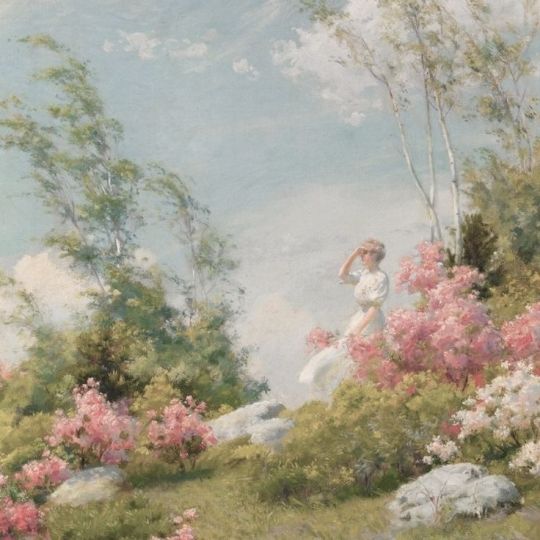
Defining Confidence:
Wikipedia says:
Confidence is the feeling of belief or trust that a person or thing is reliable. Self-confidence is trust in oneself. Self-confidence involves a positive belief that one can generally accomplish what one wishes to do in the future. Self-confidence is not the same as self-esteem, which is an evaluation of one's worth.
In our daily lives, confidence manifests itself in various forms – from speaking up in meetings to pursuing our passions fearlessly. It's the quiet resilience that allows us to bounce back from setbacks and the unwavering faith in our potential to achieve greatness.
Self-Confidence vs. Arrogance:
It's essential to distinguish between self-confidence and arrogance, as they often get misconstrued. While self-confidence stems from a genuine belief in oneself, arrogance stems from an inflated sense of superiority and entitlement. Self-confident individuals exude humility, empathy, and a willingness to learn from others, whereas arrogant individuals may display condescension and a lack of regard for others' opinions.
Confidence is about lifting others up and empowering them to succeed, whereas arrogance is about elevating oneself at the expense of others. By cultivating self-confidence grounded in authenticity and humility, we not only uplift ourselves but also create a positive ripple effect in our communities.
Love yourself for who you are 💗
6 notes
·
View notes
Note
One thing I've noticed about how the Heroes seem to be operating under this harmful thinking of "It's okay if WE do it" kind of thing.
Like using Eri to heal Mirio's quirk, did they ask her first before doing it? Was Mirio really on board with this? All they said was that she was practicing her quirk on lizards and that's it.
And then have Shinsou brainwashing Gitanto. And then they try to make it less worse by revealing he secretly hated AFO for abandoning him when in actuality it's just used to not make the heroes look bad.
It's moments like these that makes the heroes, people we're supposed to be rooting for, look worse than the actual villains by having them do shit like this.
And with all their talk of "the kids will grow up to be better heroes than them" how are we supposed to believe this when we don't get their povs on these kind of things and seeing even going along with this?
God the writing is so bad...
Hi @theloganator101👋,
The writing and messaging in this series is atrocious at times. Especially with this. I do not believe the kids will grow up to be better than the adults before them at this point.
Everyone on the hero side definitely believes - "It's ok if WE do it."
1) Using Eri to heal Mirio has so many issues. Why is it ok for the heroes to use her to give Mirio his quirk back yet not ok for Overhaul to use her to make his bullets? (Overdouche was unnecessarily cruel to her however if he wasn't and was just taking her DNA via blood tests you bet the heroes would still have an issue with him using her to make his bullets.)
Eri has essentially gone from one situation where she is being violently abused and used for her quirk by a villain. To UA where she is in a nicer environment, being treated kindly (as a pass the parcel / class pet in a way in the care of the UA faculty.)
It seems like a harsh example but think about it. Think about how class pets are treated; kindly, brought out now and again to "aww" at and shared care given among the faculty/students. She's given no character, no trauma response the heroes help with, in fact they are using her again and they only have her in their care because they can use her. Which doesn't sit right at all with me.
2) Shinsou brainwashing Gigantomachia. You are right. I also hated this moment so so much. Am I meant to root for Shinsou or his story at this point? How can I when he is doing something that typically only the villains do in these types of stories? If he were brainwashing him to evacuate civilians / keep them safe I could understand but forcing him to attack AFO who he "loves". Not on. At all.
Whose idea even was it to do that and why is KIRISHIMA riding Gigantomachia like an animal?! It's so dehumanizing and humilating.
Gigantomachia's "anger" at AFO felt shoehorned in as a way of Hori forcefully trying to make us believe that what Shinsou is doing isn't that bad. But it is.
Put it this way - If a hero and their friend got into a fight, the friend was hurt by something the hero did - would it be ok for a villain to brainwash the friend to attack the hero? By Hori's logic here, the villain was ok to do that, the friend was upset at the hero so definitely wouldn't object to being forced to attack them.
This moment really soured my opinion on both Kirishima and Shinsou, but Shinsou especially.
Shinsou, who is meant to have a 'villianous quirk', yet Hori made him be praised, arrogant with a chip on his shoulder in his backstory. Now, he is someone to be rightfully wary of and who acts in a villianous way similar to 'The Dictator.' You know, the villain who AFO sent just before the 1A vs Izuku mess - who mind controlled all the civilians to attack Izu? Yeah this would be like that but if the Dictator got 1A at this moment and controlled them to attack Izuku. (Something I would have preferred to the 1A vs Izuku mess - as they would have been forced to fight him rather than doing it willingly.)
The fact that I can even make this comparison and make it have wieght is god awful. Hori's writing of the guys we are meant to root for is god awful.
#mha critical#bnha critical#Shinsou hitoshi critical#Kirishima Ejiro critical#UA critical#Koala dont look
44 notes
·
View notes
Text
Byronic Hero Bracket Round Of 128 Batch A #5
Melchior Gabor from Spring Awakening vs. Vaarsuvius from The Order Of The Stick

Reasons under the cut (spoilers for both)
(All sources from TV Tropes)
Melchior Gabor:
Melchior Gabor of Spring Awakening: an intelligent, charming, enlightened youth who is ahead of his time and deeply troubled by his repressive society and his own developing urges as he comes of age.
Previously Beaten: Augustus
Vaarsuvius:
Vaarsuvius is an arrogant, condescending Elf Wizard with a taste for ultimate arcane knowledge and power, and is very long-winded and verbose in speech. Despite this, V is dedicated to stopping the forces of evil, does care quite a bit for their teammates, isn't above indulging a bit of silliness, and even has a family. Another unique trait is that rather than a Dark and Troubled Past, they have a Dark and Troubled Present. We have making a deal with some fiends to gain ultimate arcane power to save their family from a vengeful black dragon (whose son V killed during an earlier story arc); the fallout from their priorities during this crisis later leads to their partner suing for divorce and full custody of the children. V then proceeds to commit one of the greatest evil acts in recent history by casting Familicide, an epic-level spell that kills the dragon and all its family, comprising over 1/4 of the black dragon population... and the Draketooth line of humans, a family who reproduce by seducing strangers and stealing the resulting children, and due to the nature of Familicide, V not only kills the family of the target, but the families of the families... resulting in literally thousands dead with a single word. Vaarsuvius then goes on to battle Xykon but lost due to hubris, only managing to narrowly avoid death at his skeletal hands. The reason why Vaarsuvius accepted the deal with the fiends in the first place? Because the alternative would mean asking their comrades and master for help, which would mean admitting to failing again (V's attitude has taken a sharp turn for the worse due to guilt over their failure in Azure City and Haley, their closest friend, being trapped there). Ultimately, while V is improving on attitude and humility, they still carry a great burden over their decision, as one strip cuts to V looking forlornly at a picture of Inkyrius, clearly missing their former mate.
Previously Beaten: Matou Kariya

#character tournament#fandom tournament#tumblr tourney#tournament poll#poll bracket#polls#tumblr polls#fandom bracket#tumblr bracket#character bracket#byronic hero#melchior gabor#spring awakening#vaarsuvius#the order of the stick
6 notes
·
View notes
Text
Cal Kestis and why people say he's a "flat" character
Alright so.... months? ago I mentioned to @ironhoshi I had thoughts on Cal's character development in Fallen Order and I meant to share then in an original post instead of response.
So a lot of people, gamers in particular, tend to comment that they did not care for Cal as a protagonist because he came across as "flat" to them. A sentiment I don't agree with but I can kind of see how other people got there being a long time gamer myself.
I think this "Flat Cal" feeling is a result of expectations vs. reality people had for Jedi Fallen Order. Particularly when it comes to Power Fantasies and Survivor Fantasies.
Videogames often play into the Power Fantasy trope, especially Dark Souls- like games as JFO was marketed. The appeal of starting off weak and vulnerable and through time, effort, and skill turning into a powerful badass. Cal certainly does start off weak and grows into more power but the game's narrative as well as Cal's character development only briefly play into it.
When you consider it, Cal beats very few of the narrative Big Bads by himself. Merrin helps him with Malicos, the Shyyyo Bird with Ninth Sister, Cere initially rescues him Second Sister | Trilla, Vader kills Trilla, and Cere and Cal work together in the end to escape Vader. Aside from Ninth Sister, there aren't many narrative beats highlighting Cal's rising power in a way that leans into the Power Fantasy trope.
Notably, even the Ninth Sister scene gets dismantled from the Power Fantasy trope. Cal brags about how he defeated the Ninth Sister. Yet instead of praise for taking down a difficult opponent, Cere cautions Cal. She's happy he is growing stronger and more confident in himself but she cautions him against arrogance. A warning Cal later acknowledges as right of Cere to make. Cal learns to embrace humility instead of arrogance or overconfidence. His swagger is tempered. He defeats the illusion of Master Tapal not by fighting but by accepting the past.
Honestly, JFO pretty much dismantles the Power Fantasy trope.
Another trope people expected of JFO was a Survivor Fantasy (which I find very ironic now that the JFO sequel has been titled Survivor). In particular, a Lone Survivor Power Fantasy. The type of trope you see in the Lara Croft reboot and the zombie post apocalyspe horror genre (such as Last of Us and The Walking Dead). The idea of a character starting off weak and isolated and is forced to grow stronger and "harden" themselves so that rise above all the adversity trying to kill them (nature or man or even society).
Again, there's definitely a similar basis for this trope in JFO. Cal is one of a few survivors from Order 66, a survivor that is targeted and hunted. A perfect set up for the trope. Except JFO chooses to explore Trauma Recovery instead. JFO is a story of healing both the self and community. It's why Cal starts off brash and threantening to cut down Merrin to handing over his lightsaber to her and Merrin choosing to aide Cal as a result. It's why seeing all the damage on Kashyyyk pains Cal and how the planet hasn't been completely ravaged gives Cal hope. It's why Cal's flashback to his master result in him moving forward instead of letting the past define him. It's why Cere and Cal go through a bumpy mentor-and-mentee relationship resulting in both of them finding the willpower to stand up and fight for what's right. Why the fight against Vader ends with Cere on the brink of giving into the dark side of the Force again and Cal reminding her she has a choice. JFO is about trauma recovery and the importance of community in that recovery process. That one does not need to and should not do things alone.
In a sense JFO is also dismantling the the Lone Survivor Trope the same way it dismantles the Power Fantasy. Of course this dismantling of tropes instead of playing into them, as many videogames do, results in people feeling disatisfied. Gameplay and premise wise, the basis is there but it isn't explored narratively. So Cal comes across as flat because his character didn't develop the way people expected him to.
In reality, Cal's character development and growth is explored through acts of kindness, empathy, and forgiveness. It's about ending self-isolation, running and hiding from your problems, in order to heal and move forward. Cal's story in JFO is about picking himself up and then offering a hand to the next downed person he sees because it's easier to get up with help.
Cal isn't flat. He simply isn't a typical videogame protagonist.
#cal kestis#jedi fallen order#sw: jfo#sw jfo#i have a lot of feelings about this game and Cal#mostly that I love its narrative and Cal's character development#idk as someone with mental health struggles this game & Cal spoke to me#i really hope Survivor carries on the good narrative and character development#eta: somebody save me from my inability to type anything correctly
119 notes
·
View notes
Note
Which version of Vegeta do you like the least, not counting Toyotaro's version?
Dang lol. Not counting Toyotaro's Vegeta, I'd probably pick Cell Saga Vegeta, then Vegeta from the first half of the Buu Saga.
In his introduction in the Saiyan Saga, you are supposed to dislike him as a person but like him as a villain. Then on Namek, he is still the same. But after being wished back to life despite not deserving such... Vegeta was still an evil asshole.
Cell Saga Vegeta didn't care for the life of Bulma nor his infant son and would rather let them die. Then he killed an innocent man when trying to kill 18. And that dude is never wished back. Vegeta openly states that his end goal is to fight Goku as a SSJ vs SSJ & kill Goku then continue his slaughter on Earth. He ignores reality the entire time because he is far too arrogant to the point that he puts his own life in danger like an idiot. He helps the main villian become perfect then deservingly almost gets killed by the monster he helped make perfect. He still denies reality. Cell Saga Vegeta is really REALLY dumb due to his abundant Saiyan Pride (which is explained to be arrogance in their strength) along with his princely pride that makes him behave like an angry man-child.
Buu Saga Vegeta was mostly neglectful to the family he acquired in an attempt to copy Goku to see if having a family would make him stronger. So his love for them wasn't even real at first. It was to copy Goku. He was so obsessed with Goku to his detriment and that of his family and the Earth. He was supposed to be changed but his princely Saiyan Pride made him let himself become possessed just so he could be strong enough to defeat Goku. And he almost hit Bulma with a ki blast when he fired into the audience to force Goku to fight him. He was really pathetic here just because he felt inferior and refused reality. Him sacrificing himself was good and all but at that point death is what he deserved. And being sent to Hell was what he deserved too. He had so many chances that he didn't deserve and he threw them all away. Vegeta was lucky to keep his body so he could help Goku fight Buu & he was lucky that Dende worded the wish differently and it resulted in Vegeta coming back to life. But at the same time, the development Vegeta had after his sacrifice is probably my favorite Vegeta moment. He finally swallowed his pride, gave due respect to Goku, fought for others and tried to help others at the cost of his life knowing if he died this time he would cease to exist. THIS IS MY VEGETA. Took him forever but he finally changed for real and was on the path of who he should be.
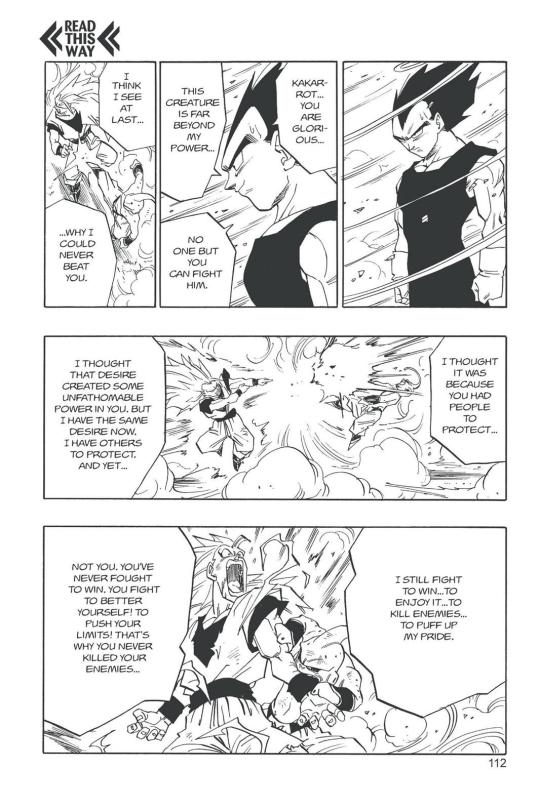
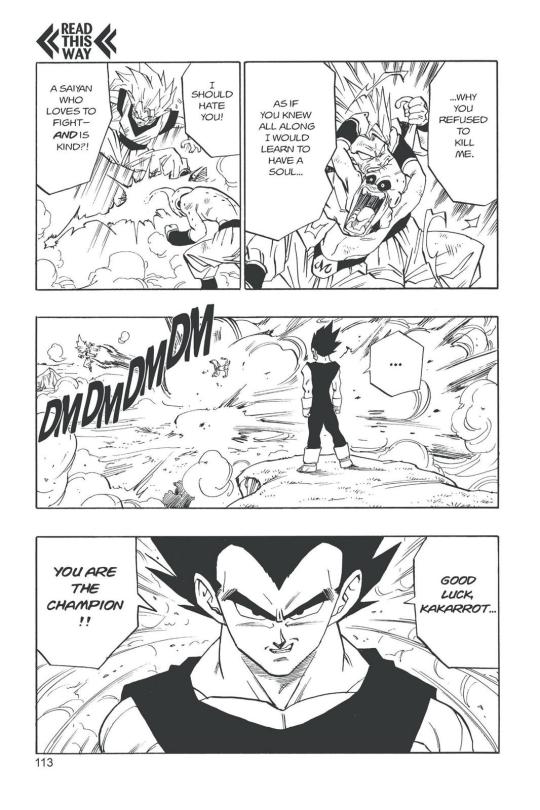
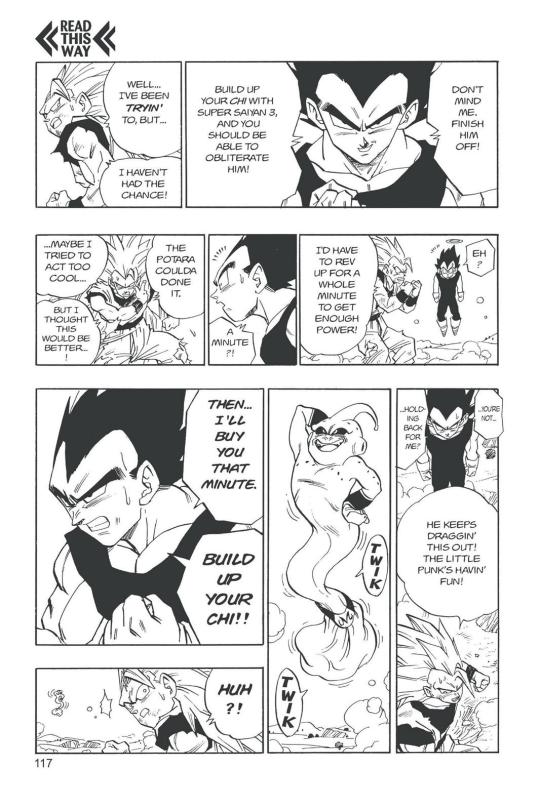
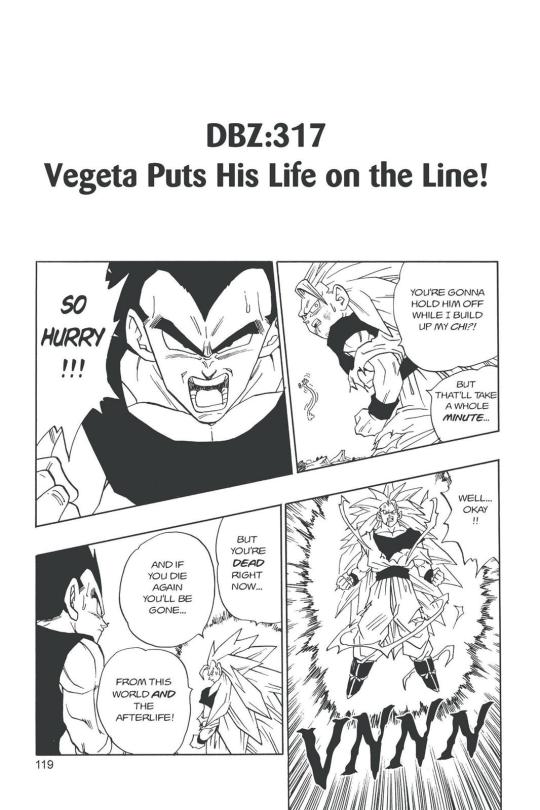
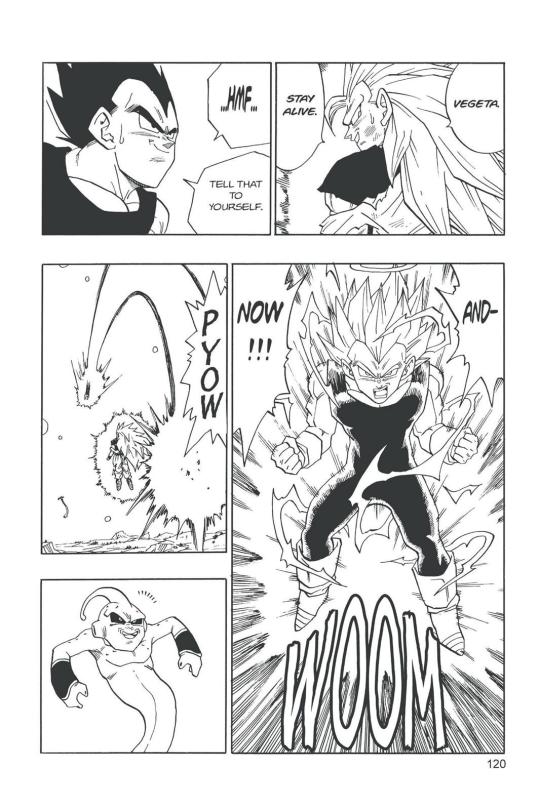
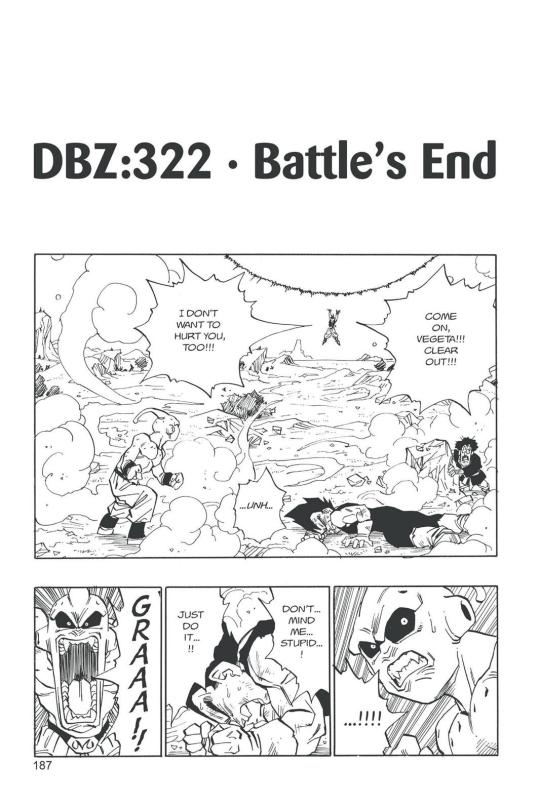
And in the end, you can see his change. He smiles and Goku give him a thumbs up.
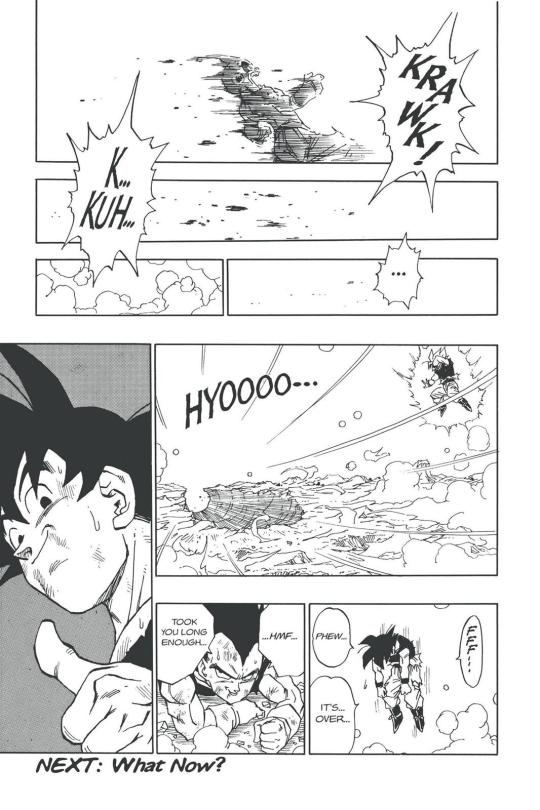

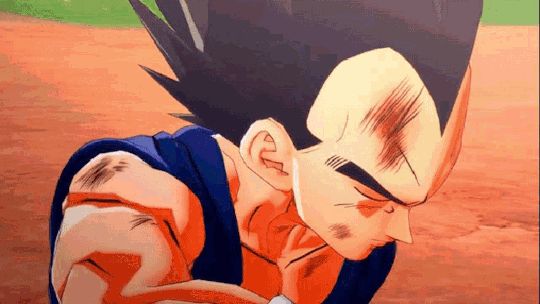
So that's why my least favorite Vegeta is Cell Saga Vegeta since I can't count Toyotaro's Vegeta lol. The 1st half of Buu Saga Vegeta is my second least favorite. Freeza Saga Vegeta is 3rd.
Extra: I kinda dislike how Vegeta was at the begining of the DBS anime. Felt like he went back to aspects of the Cell & Buu Saga. But after training with Whis and learning discipline, humility, & how to show respect... He improved. DBS anime Vegeta was at his best imo during the Tournament of Power. He got his first transformation that came from caring about others. Every other transformation was either entirely selfish or just something he learned.
6 notes
·
View notes
Note
if you had to rank them, which dynamics do you prefer?
Evil!Chase and good!Omi
Evil!Chase and evil!Omi
Good!Chase and good!Omi
Kitty!Omi and Dragon!Chase
Kitty!Omi and Chase
Omi and Dragon!Chase
Thank you for this wonderful ask anon! And I’m really really sorry for this late reply!
This answer is going to be a long nonsensical ranting because this is what I love so much so I’m sorry in advance XD we’re really in it now anon
Evil!Chase and Good!Omi:
The classical dynamic that pull me in like a mad person. It’s all about that delicious irony of the evil and vile antagonistic force being the only one who truly understand and obsessed with bringing out the blossoming potential of the young and naive protagonist of the opposite side. “I can fix him” “I can make him worse”. Chase wanted to forced Omi into his folds and principals. Chase care about Omi too much to actually leave him scars in any way. Chase believe in Omi in a way that no one else cannot. Chase doing all of that while staying true to his selfish and tyrannical way until the very end. Evil mentor who actually act and even wanted to be a mentor to this Xiaolin young warrior. They never truly give up on each other, for the better or the worse. Omi get his ego inflated because of Chase. Omi learn true humility because of Chase. Individuals who feels isolated from their peers because of the inferiority complex cause by themselves and others. Chase in one way or another help Omi avoid Chase’s own fate. This is the pinnacle of everything that keep me up at night. Peak protagonist and antagonist dynamics. XC prove that this relationship is the true core of their character development because without it Chase and Omi are just simply horrible people.
Evil!Chase and Evil!Omi
This is the most hypocritical thing Chase had ever done and I love it. Chase is so deep in delulu land and as the same time he isn’t. Omi will join me this Omi will join me that and then he’ll do the brainwashing anyway. Funky little murder monk jumping around his lair. Chase thinks this is completely normal. Omi’s first man hunt yayyyy. Omi’s first time betraying his friends and master yayyyy. Omi first time experiencing the evil that he’s always fight tooth and nail against yayyyyy. Omi’s first time being robbed of his own agency by his own mistakes yayyyyyyy. Imagine knowing that you can’t really convince your self proclaimed student to side with your ideals so you just make a very convoluted plan to brainwashed him and make him loyal to you after by his honor code, couldn’t be me. Evil!Omi is always laughing but there’s nothing but bitterness in their situation, it’s hysterical, it’s vile, I hate and love it so much.
Good!Chase and Good!Omi
I’m sorry for being mean but we know who will win the custody battle between Chase and Fung. Og Chase is evil and even then people are seriously consider just let Chase raise Omi anyway. With good Chase there isn’t even going to be a competition. He literally kneel down to talk to Omi on eyes level. He’ll throw hands with the most dangerous Heylin warrior to protect Omi. “We’ve never met but I feel like I know you”. Vs Fung who thinks that acknowledging Omi’s need for validation from parental figures for once will make him arrogant. Chase and Omi knew each other for like a day and immediately become generation gap besties. The path that og Chase could have had if only there was someone stopping him from going to the wrong path, the true verdict for Chase’s nobility if fate had given him a chance. It’s the foreshadowing Chase redemption arc that only appears in my dreams because of course season 3 have to be about beans
Kitty!Omi and Dragon!Chase
All I’m saying it if you go back to the fight for Omi’s freedom battle episode, when Chase crawled after Omi to get him and Omi yells the classic sparrow eating hot dog that literally throws Chase of his reptile maniac mode for a second, you can see just before that moment, Dragon!Chase looked like he was actually grab kitty Omi by his own hands. Like, just give the cheese kitty a really bone crushing hug to stop him from starting a revolution against your dictatorship with his friends. We got a doting cat owner in the form of a giant lizard and his rebellious newly acquired cheese kitty who give him headaches but he still love him. I’ve been thinking about that for five years.
Kitty!Omi and Chase
Look at me I’m like the new overlord of the earth, just split it in halves btw, there’s fire and blood and agonizing screams of the damned around me and all, real hectic if you asked me, I wonder how I can ransack the next poor neighborhood with a bunch of volatile, vicious army of well trained warriors turned predators, and-oh Omi do you need a scratch? Okay let me just stop literally everything I’m doing real quick.
Omi and Dragon!Chase
This is the real reason why Chase wanted to recruit Omi, only after that did he realized Omi’s potential too. Omi is a dangerous-side-of-nature magnet and Chase is an oversized venomous (figuratively and literally) lizards with an army of carnivorous cats. It just simply what’s going to happen. Nobody can ovoid it. Mother Nature put attracting weird creatures in Omi’s genes.
Annnnnd lastly, my personal favorite dynamic, Good!Chase and Evil!Omi
Long story short, this fine young gentleman have a crazy chihuahua who will bites every one except him. He’s think his chihuahua is the most cutest thing ever. He knows about the bitings tho, but whether he cares or not it’s entirely up to debate. In conclusion pure dose of serotonin for me.
#xiaollin showdown#local lizard man adopts local cheeseball#chase young and omi#chase young#omi#my answer#fave
6 notes
·
View notes
Text
Audio - Lessons in Tanya 33
Chapter 22. We continue on the topic of Divine vs Human speech with a discussion of the Torah speaking in the language of humanity. The Torah uses our way of seeing the world to describe Gd, so on some level we see Gd’s speech as being “separate” from Gd. This leads into a discussion of how Gd can allow for the notion of denial of Gd in the universe, exploring in greater depth the ramifications…
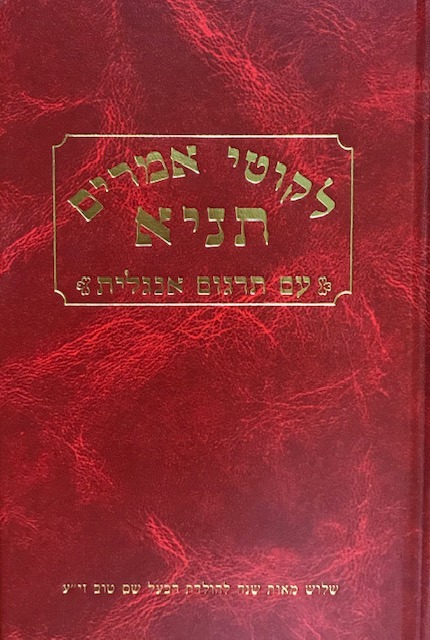
View On WordPress
#Alter Rebbe#arrogance vs humility#growth#Lessons in Tanya#new beginnings spiritual coaching and consulting llc#podcast#podcasts#spiritual growth#Spirituality#Tanya#the torah speaks in the language of humanity#tzimtzum
0 notes
Text
Arrogance vs. Humility: Loki
In the first part of meta the arrogance of Thor and Loki and how it shows itself in different ways was analyzed. In this part I want to focus on Loki's arrogance and his humility arc in the series.
The og post that inspired this meta, and many fans, believe that Loki didn't need a humility arc and I originally agreed with them. Sure Loki was arrogant sometimes but it wasn't that bad for him to need to become humble. @geehollow 's meta and the study about arrogance changed my mind though. There were certain aspects I had overlooked or underestimated their importance.
As it was explained, the first movie puts Loki's strength, his intelligence in contrast to Thor's physical strength. Thor's arrogance is easily recognizable because of Thor's extrovert boastful attitude. Loki's not so much. That doesn't mean Loki can't be just as arrogant. Unawareness of one's intellectual limits spans components 2 through 5 of arrogance.
An overconfidence in one’s own knowledge and ability (Component 2) is tied together with an underconfidence in the knowledge or ability of others, producing a feeling of intellectual superiority (Component 5).
The intermediate components (3, resisting new information about oneself, and 4, not taking the perspectives of others) appear to be bridges between Components 2 and 5. For example, individuals low in honesty-humility (presumably high in arrogance) are also less likely than others to make cooperative decisions (Zettler, Hilbig, & Heydasch, 2013).
These two paragraphs perfectly describe Loki's reasoning and planing through the first movie and later during Avengers. In avengers from the very first moment he tries to gather enough knowledge of his opponents and neutralize their threats. But the little seemingly unimportant details that he misses and an overestimation of his abilities result in his defeat.
In the series, most notably in the finale he does it again. Perhaps if he can fix the mistakes, the uncounted incidents, consider every possible outcome that things can go wrong, he can save the people he cares about. What if he spend centuries learning knowledge? What if he tries to stop Sylvie in every way he can think of? But none of his plans work. The loom was designed in a way to counter every possible outcome that results in new branches.
And it all comes down to the question how to decide who lives and who dies? With all the knowledge, abilities and experiences Loki has gained through his constant time slipping, he can't answer this question. And that humbles him. It's a question he can't answer and a burden he can't accept. But he can give the chance of free will and freedom to people to write their own stories.
When Loki makes his decision, it is not resulted from a desire to prove himself to someone, or a desperation for control or a sense of superiority. It is a decision born out of love, selflessness and believing in himself with full awareness of the limits of his knowledge and abilities. This intellectual humility shows itself in the wonder and wisdom in his expression when he tries to power a thread of time for the first time. And his decision is in complete contrast to HWR's selfishness and arrogance. In the end Loki has all the knowledge of multiverse at his fingers but without a shred of arrogance for it and I think it's a beautiful arc.
Source: Foundations of Arrogance: A Broad Survey and Framework for Research
Previous: Thor
17 notes
·
View notes
Photo
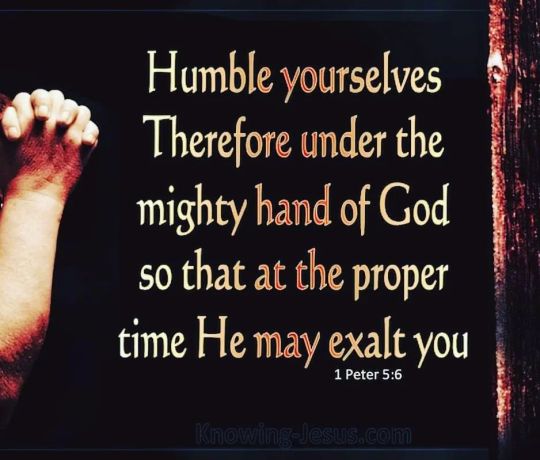
Be clothed with humility Part 2 Humble yourselves 1 Peter 5:5-6 5 Likewise, ye younger, submit yourselves unto the elder. Yea, all of you be subject one to another, and be clothed with humility: for God resisteth the proud, and giveth grace to the humble. 6 Humble yourselves therefore under the mighty hand of God, that he may exalt you in due time: Verse 5 Likewise, you that are younger (and of lesser rank) be subject to the elders, the ministers and spiritual guides of the church, giving due respect and yielding to their counsel, clothe (apron) yourself, all of you, with humility. Wear the garb of a servant, so that its covering cannot possibly be stripped from you, wear the humble garb with freedom from pride or arrogance toward one another. For God sets himself against the proud, the insolent, the overbearing, the disdainful, the presumptuous, the boastful but rather opposes, frustrates, and defeats them. But God gives grace to the humble therefore humble yourselves. When we put on clothes, they go everywhere our bodies go! Humility is a lifestyle. Our clothes can often make an outward statement of the type of person we are on the inside. What, would you guess unbelievers would think of a Christian clothed in humility. Verse 6 Yes, you say, but how, do I put on the garment of humility. Here is how, turn your eyes upon Jesus, look full into his glorious face and his sinless character and then begin to compare yourself with him! His life – your life His love – your love His holiness – your holiness His power – your power His forgiveness – your forgiveness His strength – your strength His humility – your humility Then you are beginning to put on the garment of humility. This whole area of pride vs humility is rooted in the ‘act of comparing’. Pride arises when we compare others unfavourably with ourselves. We speak like a Pharisee ‘I thank you Lord I am not like him or her’! Such pride can destroy fellowships. What would happen if a church leader says to their team, you are just not in my league? If you must make comparisons Start with yourself and Jesus Consider others more worthy than yourself Form an honest opinion of your life in the l https://www.instagram.com/p/CmDytw2IOCO/?igshid=NGJjMDIxMWI=
5 notes
·
View notes
Text
Dragon Ball Super 122
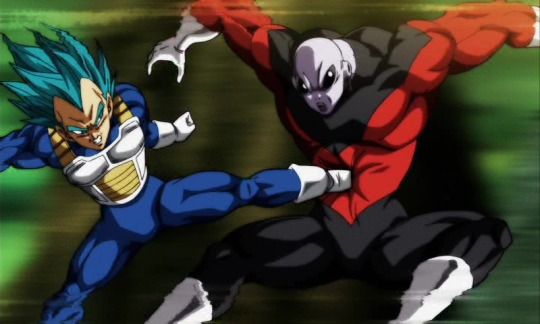
>:D o8<
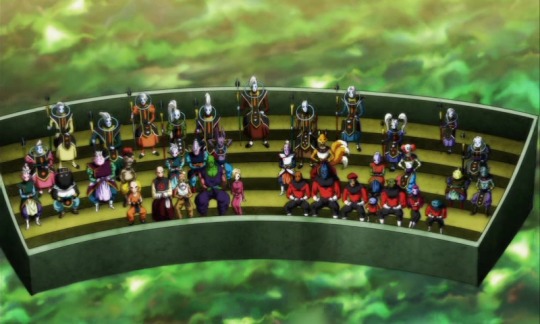
Last time, Universe 3 was eliminated leaving the Tournament of Power down to just eight fighters in two universes. Since the bleachers are looking pretty empty, the Grand Minister shrinks them down to a cozier size.
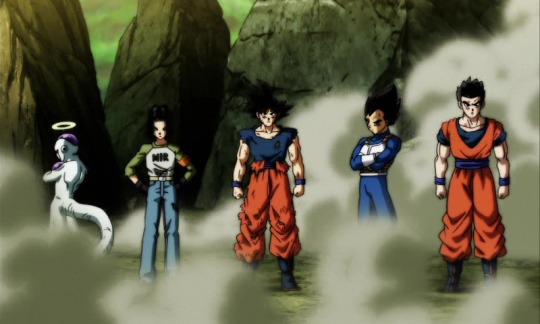
On the Universe 7 side, we have Frieza, 17, Goku, Vegeta, and Gohan.
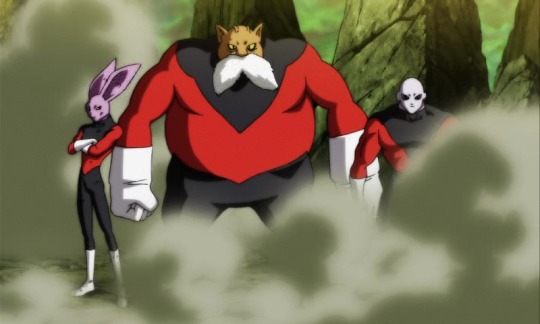
On the Universe 11 side, we have Dyspo, Top, and Jiren.
I like this 5-on-3 situation, because it gives U7 an advantage in numbers without making it too ridiculous. Jiren has proven to be unstoppable so far, so if it was 3-on-3, you’d just have Goku vs. Jiren while the other two fights would end up being unimportant. And if it was 6 against 3, you’d end up with three double-team affairs, which would make U7 look like jerks. But this way, you can switch things up, which makes it more interesting. At any given time, somebody on the U7 team will have to fight alone, and how well can they hold out?
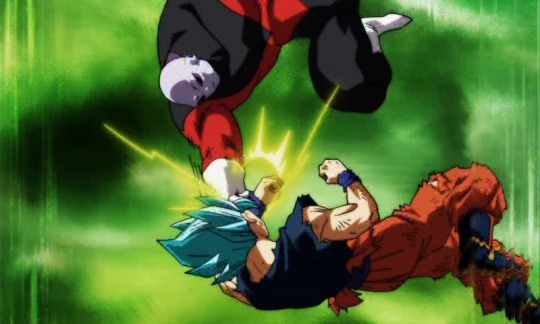
Naturally, Goku and Jiren go at it. Goku’s wanted to take another shot at this guy for a while now, and Jiren wants to take out the strongest opponent first.
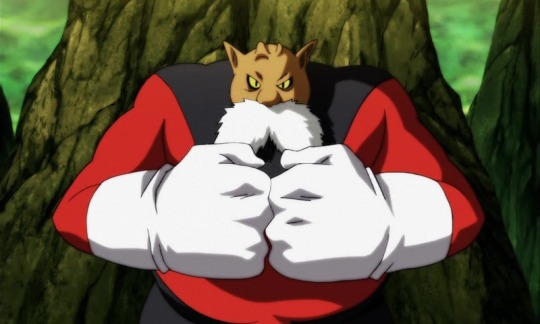
Gohan and 17 take on Top. “Watch out for his enormous hands!” Gohan warns. “You wouldn’t want to get caught in those!”
“Uh, yeah, good call,” 17 says, trying not to roll his eyes.
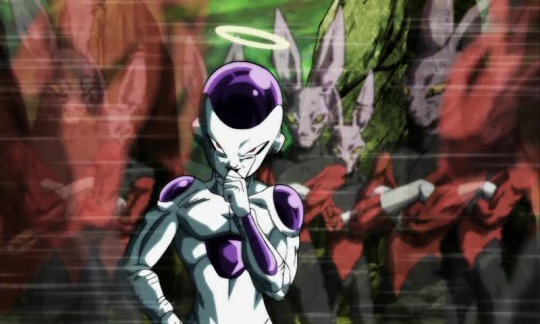
Meanwhile, Frieza battles Dyspo. At first, Frieza is unimpressed with Dyspo’s speed.
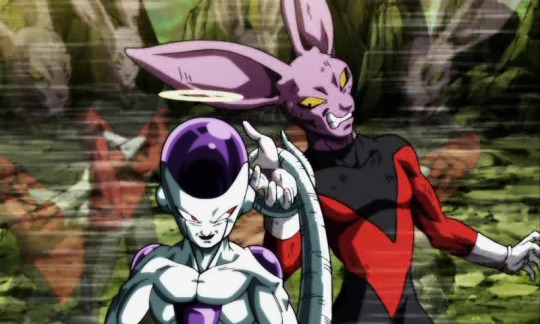
Then Dyspo tries to shoot him in the back, and Frieza snatches his wrist with his tail. So now Frieza’s really unimpressed.
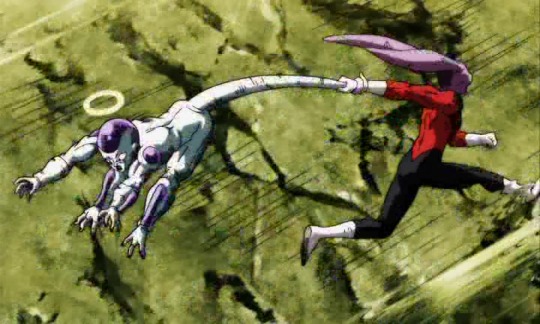
Then Dyspo starts running around, dragging Frieza behind him and slamming him into everything he can find. One of the highlights of this part of the arc is seeing Frieza get absolutely brutalized by the U11 team, and this is just the start.
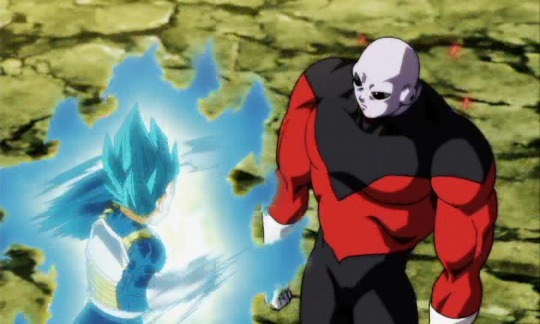
As for Vegeta, he jumps between Goku and Jiren, demanding to take on Jiren himself. He makes a valiant effort....
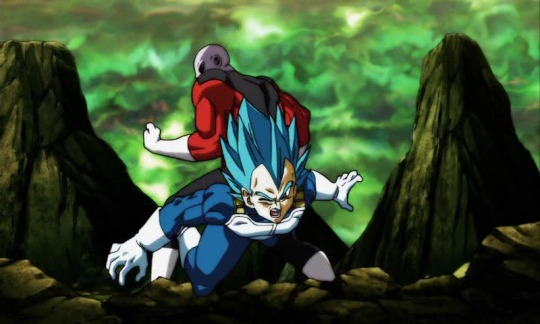
...but gets clobbered.
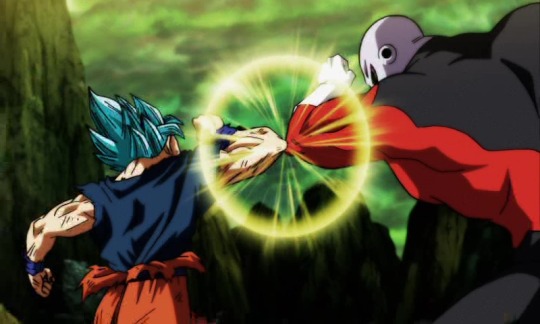
But while he watches Goku fighting Jiren, Vegeta starts to notice a flaw in Jiren’s style, one that he knows he can exploit. So he jumps back in again...
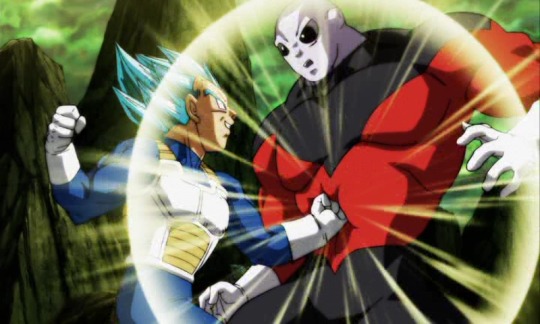
And this time he manages to land a blow. Jiren tries to shrug him off...
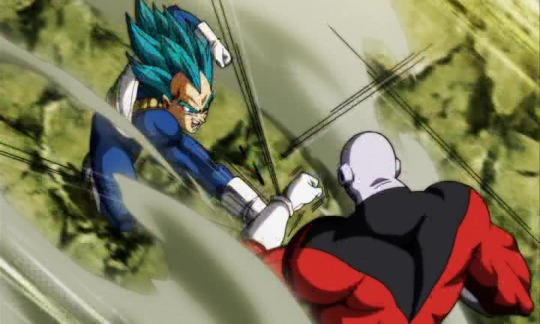
But this time, Vegeta’s got him where he wants him. For a time, they seem to fight evenly.

And Vegeta lands another heavy blow. It’s like he’s got the big guy scouted. Whis begins to wonder if Vegeta is starting to find his own way to Ultra Instinct.
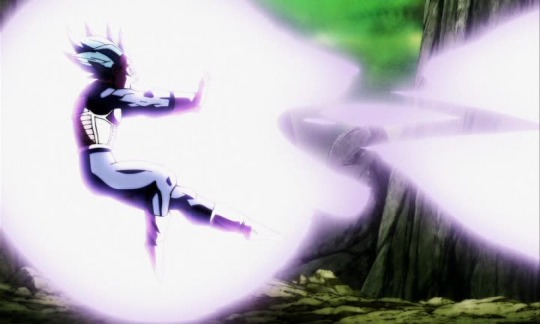
Jiren knocks him away, but Vegeta recovers and shoots a Gallick Gun at him.

But then Jiren beats him down properly and blows him across the ring.
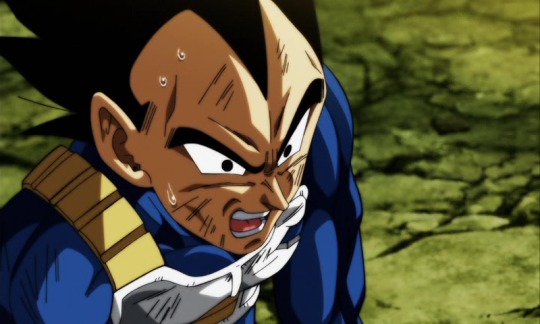
But Vegeta still isn’t down. He’s only just begun to fight.
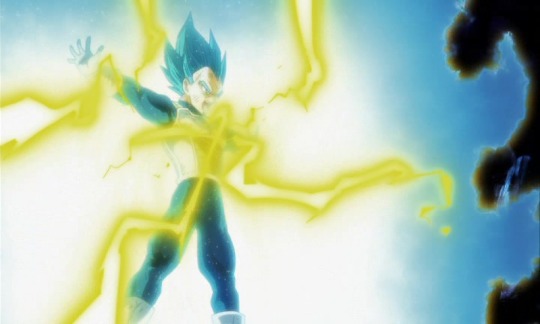
Jiren dismisses Vegeta as arrogant, motivated by ego and self-entitlement, like that’s supposed to demoralize him. Instead, it just fires Vegeta up. Of course he’s arrogant. It’s his pride in himself and in the Saiyan race. Is he supposed to be ashamed of himself right now? Like Jiren’s some role model for humility now? Fuck that noise.
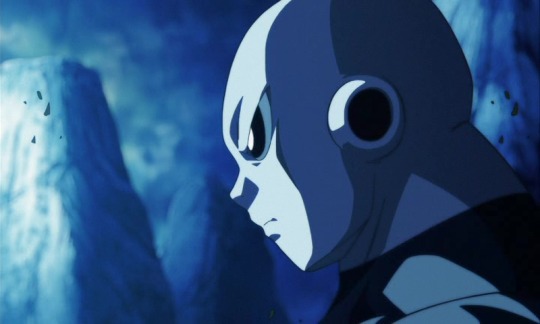
Vegeta dares him to take a Final Flash head on if Jiren truly believes Vegeta is no threat. Jiren agrees.
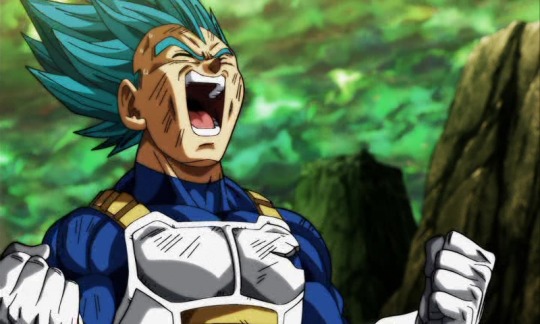
And for a moment, it looks like Vegeta has taken Jiren down. He gets all happy with himself...
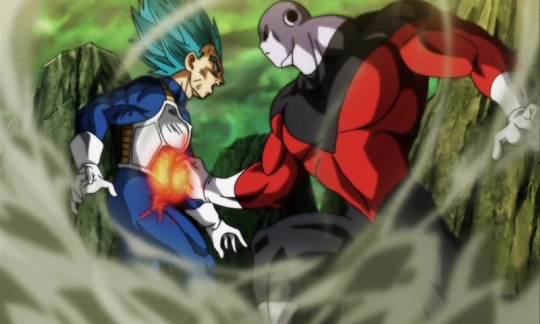
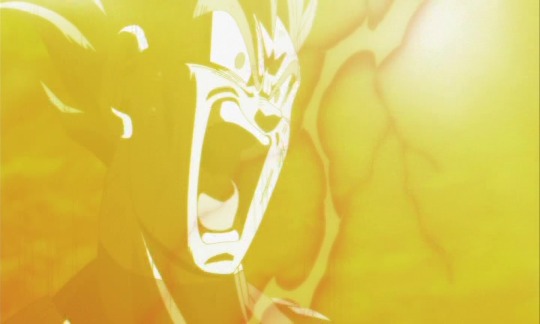
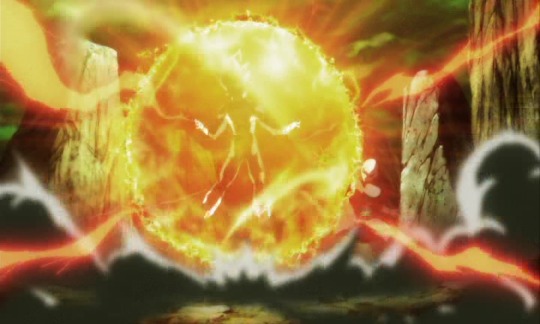
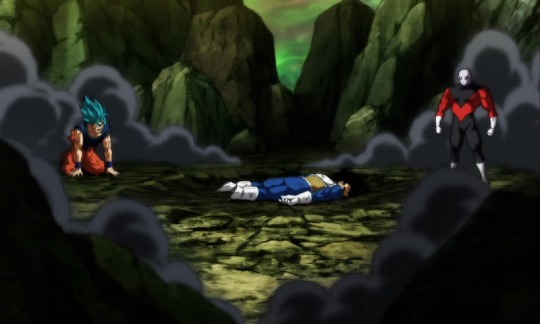
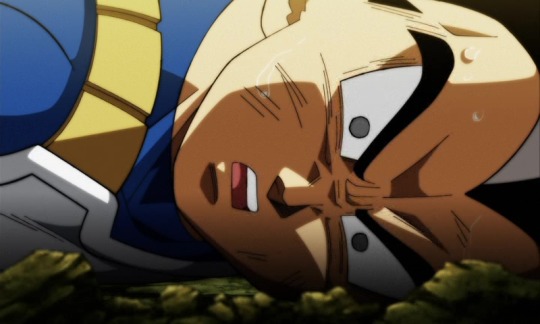
Yeah, that’ll happen.
Here’s KISS with “Watchin’ You”.
youtube
5 notes
·
View notes
Note
Hey I was looking at your old miraculous post about pairs, counterparts, and foils. It got me curious about something, you did them for the duo and the wu xing but what would you do for the zodiac. The easiest thing to do is to use the opposites, but what I'm curious about is the themes you can go for. The only ones I can come up with a theme for are the rabbit and rooster being themed around the moon and sun.
That's something I've thought a little bit about, but not something I've delved too deeply into as that's 12 animals to think about. Canon also didn't really help with their powers being all over the place scale wise. But in terms of opposites...
But yeah, Rooster and Rabbit easily could be sun and moon, could also do flamboyance vs subtlety, arrogance vs humility, honesty vs deception (as the Rabbit is a trickster in some cultures).
Uh... Horse and Rat could be independence vs dependence?
Monkey and Tiger levity vs gravity/seriousness?
Ox and Goat, stubbornness vs flexibility??
Idk.
I haven't thought about counterparts and foils in the Zodiac hardly in terms of opposites, of soulmate matches, and elemental matches. A big part of that was that canon took so long to get all the Zodiac powers out, and now they're out, I'm not so invested in ML to think about it. And I don't really want to atm as that's 12 animals to think about and connect in some way.
12 notes
·
View notes
Note
Oh I’m feeling the Lindir/Thranduil thing totally. Like they are… hhhhh. They’re almost up there with Celrond and Celrondir tbh.
there's something so spice about them because of the contrast.
Like Thranduil's self-assuredness and arrogance and charisma vs Lindir's anxiety and (sometimes self-abasing) humility.
Thranduil's extreme height paired with my headcannoned short & smol Lindir
Thranduil being a literal king & Lindir just being a staff member in Elrond's household
Thranduil being prickly on the outside (he's soft though! he has a soft spot!) vs Lindir being so eager-to-please and sweet
and of course on a more NSFW route, Thranduil being such a self-assured, confident sadistic pleasure dom and Lindir being the sweetest shyest masochistic little sub.
it's so so so spice
9 notes
·
View notes